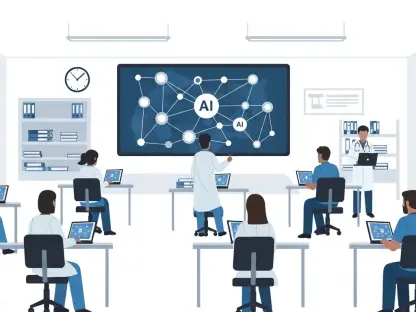The integration of artificial intelligence (AI) into the medical field has been drawing significant attention from researchers and healthcare professionals. AI-powered chatbots, particularly those employing large language models (LLMs), are being investigated for their potential to assist physicians in making better clinical decisions. The aim is to explore the collaborative possibilities between AI chatbots and physicians, examining how AI-assisted decision-making measures up against unaided physician judgment, and the wider implications of such technology in clinical settings.
The Role of AI in Medicine
AI chatbots have been becoming increasingly prominent in the healthcare sector, initially serving primarily for basic disease diagnosis. However, the scope of their capabilities extends well beyond simple diagnostic tasks. Recent advancements have seen these chatbots being tested for their potential in handling more intricate clinical management reasoning. By harnessing AI, medical professionals can leverage the technology’s ability to process and analyze vast datasets, potentially uncovering insights that may not be immediately apparent to human doctors.
The primary objective of integrating AI within medicine is to create a dependable assistive tool for physicians, guiding them through complex medical scenarios. The capability of AI to enhance medical decision-making resides in its proficiency to process vast troves of data, helping doctors refine their decision-making processes and potentially resulting in improved patient outcomes. Nonetheless, the practical effectiveness of these AI tools in real-world clinical environments remains a pivotal area of research and contemplation.
Study Highlights and Methodology
One notable study, spearheaded by Jonathan H. Chen, MD, PhD, focused on evaluating the performance of AI chatbots in clinical management reasoning. The research scrutinized the comparative effectiveness of chatbots, physicians utilizing chatbots, and physicians depending solely on internet searches and medical references. The aim was to determine if AI-assisted decision-making could significantly enhance physician performance.
The study design incorporated three distinct groups: chatbot alone, doctors equipped with chatbot support, and doctors relying on internet and medical references. Each group received five de-identified patient cases and was tasked with providing comprehensive written responses. These responses were subsequently evaluated by board-certified doctors using a standardized rubric. The findings revealed that chatbots independently outperformed unaided doctors in clinical management reasoning, and physicians using chatbots performed on par with the chatbots themselves.
Clinical Management Reasoning with AI
Central to the research was the exploration of how AI chatbots manage multifaceted medical decisions. These often entail determining the optimal course of action for patients with specific medical histories and individualized treatment preferences. AI chatbots are engineered to take into account numerous contextual factors essential for making well-informed decisions.
The advantage of AI chatbots lies in their capacity to process and scrutinize extensive data sets, thus offering insights that might be overlooked through traditional medical references. This capability is particularly beneficial in contexts necessitating nuanced decision-making. The study’s outcomes suggest that AI chatbots can provide significant assistance to physicians in navigating intricate clinical scenarios, effectively supporting them in making complex medical decisions.
Experimental Design and Results
The experimental design of the study was meticulously structured to appraise the effectiveness of AI-assisted decision-making. The three groups—chatbot alone, doctors with chatbot assistance, and doctors with internet and medical references—were measured based on their ability to manage clinical cases. Detailed written responses generated by each group were meticulously evaluated by board-certified doctors.
The results gleaned from this study were illuminating. AI-assisted doctors were found to make decisions as effectively as the chatbots themselves, while doctors without AI support underperformed when compared to both the chatbots and AI-assisted physicians. These results signify that integrating AI tools can greatly enhance physician performance in clinical management reasoning, offering a substantial improvement over unaided human decision-making.
Future Directions and Potential Benefits
The promising results of the research pave the way for various potential avenues for future inquiry. One key area of interest is to investigate whether the enhanced performance of AI-assisted doctors is attributable to the AI providing unique insights or stimulating critical thinking among the physicians. This understanding can play a crucial role in optimizing the synergy between AI and human physicians.
Further exploratory studies are required to examine how AI and humans can best complement each other’s strengths within the realm of medical decision-making. The advantages of employing AI tools as supplementary aids, rather than replacing human doctors, are considerable. By effectively combining the strengths of both AI and human physicians, the healthcare industry can aim for improved patient outcomes and more efficient clinical practices, setting a new standard in medical decision-making processes.
Research Collaborations and Support
The study saw collaboration among numerous prestigious institutions, including the VA Palo Alto Health Care System, Beth Israel Deaconess Medical Center, and Harvard University. The research received funding from reputable organizations such as the Gordon and Betty Moore Foundation and the Stanford Clinical Excellence Research Center. These collaborations bear witness to the importance of interdisciplinary undertakings in advancing medical research and innovation.
The involvement of multiple esteemed institutions and funding bodies underscores the study’s significance and its potential impact on the field of medicine. Such collaborative efforts are crucial in driving advancements and realizing the full potential of AI integrations in clinical practice, ensuring that the findings are robust and widely applicable.
Impact and Guidance for Future Use
The integration of artificial intelligence (AI) into the medical field is gaining substantial attention from researchers and healthcare professionals. AI-driven chatbots, especially those utilizing large language models (LLMs), are being explored for their potential to aid physicians in making improved clinical decisions. The objective is to investigate the collaborative opportunities between AI chatbots and healthcare providers, analyzing how AI-assisted decisions compare to those made solely by physicians without technological aid. Furthermore, the exploration seeks to understand the broader implications of incorporating such technology into clinical environments and how it could impact patient care, healthcare efficiency, and overall decision-making processes. The focus remains on ensuring that AI serves as a beneficial tool rather than a replacement, enhancing the capabilities of medical professionals in providing accurate and timely diagnoses and treatments.









